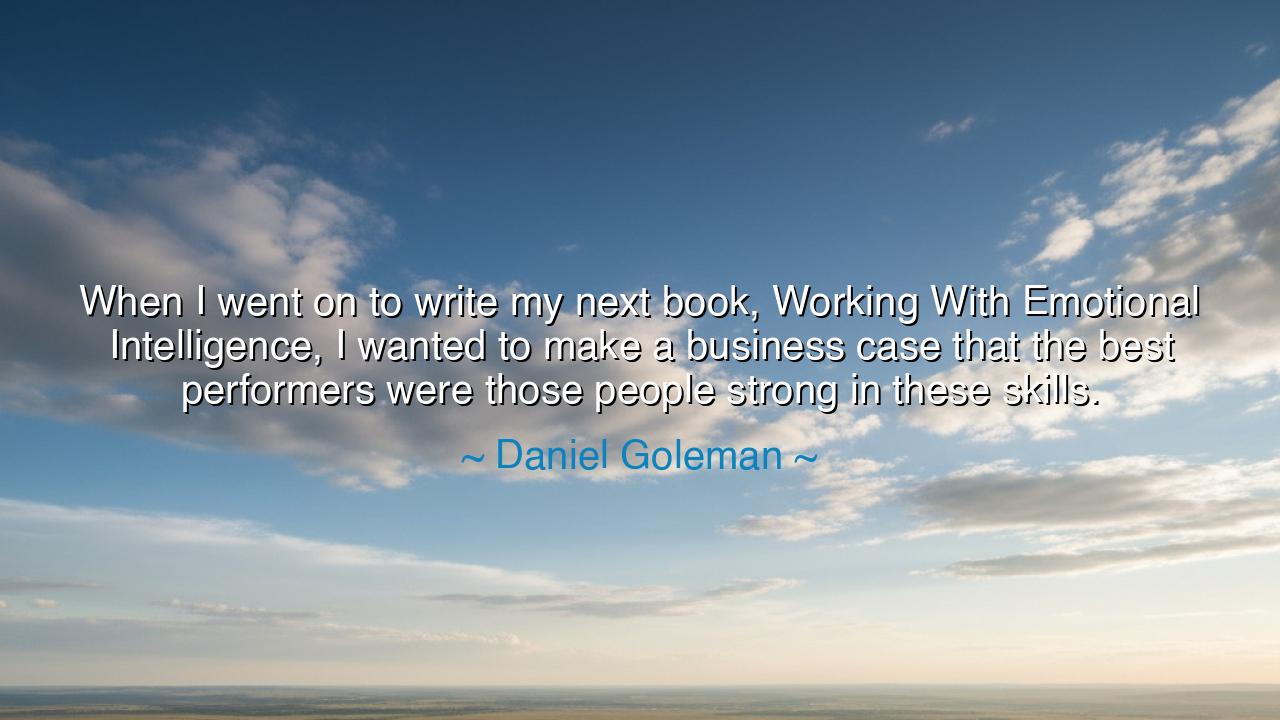
When I went on to write my next book, Working With Emotional
When I went on to write my next book, Working With Emotional Intelligence, I wanted to make a business case that the best performers were those people strong in these skills.






When Daniel Goleman wrote, “When I went on to write my next book, Working With Emotional Intelligence, I wanted to make a business case that the best performers were those people strong in these skills,” he was doing more than presenting a theory—he was proclaiming a truth that bridges the worlds of the mind and the heart. His words stand as a torch to guide all who seek excellence, reminding us that success is not born from intellect alone, but from the wisdom of emotion, from the mastery of self, and from the understanding of others. Goleman’s insight calls back to the oldest of teachings: that character is the foundation of greatness, and that the power to lead, create, and endure lies in one’s ability to feel wisely.
The origin of this quote lies in Goleman’s life’s work as a psychologist and writer, particularly after the impact of his first book, Emotional Intelligence. There he showed that intelligence, as measured by IQ, is not the sole predictor of success or fulfillment. In his later work, Working With Emotional Intelligence, he sought to demonstrate that this truth also holds in the realm of work and leadership—that in business, in service, in creation, it is those who possess emotional awareness, empathy, and self-control who rise above mere competence to true mastery. When he speaks of “making a business case,” he means proving to a world of data and logic that the heart, too, is a form of intelligence, one that fuels performance more reliably than technical skill alone.
The ancients, though they lacked the language of psychology, knew this deeply. The Stoic philosophers—Seneca, Epictetus, Marcus Aurelius—taught that a person’s power lies not in circumstance but in the mastery of their inner world. The Stoic leader was one who ruled first over himself: his emotions, his impulses, his pride. Goleman’s teaching is the modern echo of that ancient discipline. For the workplace, like the battlefield or the court, is governed by emotion as much as reason. The greatest generals, artists, and statesmen were not those who felt nothing, but those who understood what they felt, who turned emotion into insight, and insight into action.
Consider the story of Abraham Lincoln, whose leadership during America’s darkest years was not built on dominance or intellect alone, but on empathy—the ability to feel the hearts of others, even his enemies. He surrounded himself with rivals, men who had once opposed him, because he valued the strength of differing perspectives. His emotional intelligence—his patience, humility, and compassion—allowed him to hold together a divided nation. Like Goleman’s vision of the “best performers,” Lincoln showed that greatness in any domain demands more than knowledge—it demands the courage to understand people.
Goleman’s insight is also a mirror to modern times, when the world exalts speed, intellect, and achievement, yet often forgets that human connection is the engine of all progress. He reminds us that it is not the one who knows the most, but the one who listens best, who resolves conflict, who inspires trust, that becomes the true leader. Emotional intelligence is the art of transforming feeling into wisdom—of using the fires of emotion to forge understanding rather than destruction. To work with emotional intelligence, as Goleman wrote, is to live with awareness, grace, and balance in the midst of challenge.
His words carry a lesson for every seeker of excellence: mastering emotion is mastering life. Knowledge can open doors, but only emotional intelligence can build bridges. The wise person learns to know their own anger and tame it, to feel another’s pain and respond with compassion, to speak not just to minds but to hearts. The one who cultivates these skills becomes not only more capable, but more human—richer in relationships, steadier in adversity, more inspiring in leadership.
So let this wisdom be written upon the heart: to succeed is to feel with intelligence and to act with empathy. The scholar must learn emotion, and the leader must learn humility. Begin by observing your own feelings—where they rise, where they mislead, and where they reveal truth. Practice patience in conflict, kindness in authority, and sincerity in speech. These are the tools of emotional intelligence, the invisible weapons of the wise.
Thus, Goleman’s teaching stands not merely as counsel for the workplace, but as a philosophy of living. He calls us to remember that human greatness is not measured by intellect alone, but by the unity of heart and mind. The truest strength, the deepest success, and the most enduring legacy belong to those who live—and work—with emotional intelligence. For such people do not merely perform well; they transform the world around them, leaving behind not just results, but the warmth and wisdom of their humanity.






AAdministratorAdministrator
Welcome, honored guests. Please leave a comment, we will respond soon